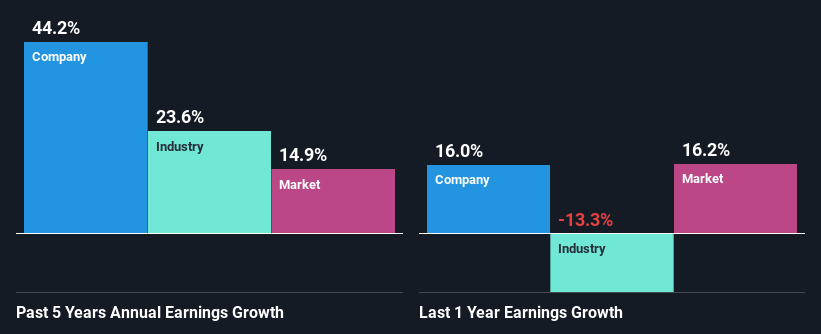Netflix’s (NASDAQ:NFLX) stock is up by a considerable 40% over the past three months. Since the market usually pay for a company’s long-term fundamentals, we decided to study the company’s key performance indicators to see if they could be influencing the market. Specifically, we decided to study Netflix’s ROE in this article.
Return on equity or ROE is an important factor to be considered by a shareholder because it tells them how effectively their capital is being reinvested. In other words, it is a profitability ratio which measures the rate of return on the capital provided by the company’s shareholders.
Check out our latest analysis for Netflix
How Is ROE Calculated?
The formula for ROE is:
Return on Equity = Net Profit (from continuing operations) ÷ Shareholders’ Equity
So, based on the above formula, the ROE for Netflix is:
27% = US$5.1b ÷ US$19b (Based on the trailing twelve months to June 2022).
The ‘return’ is the profit over the last twelve months. Another way to think of that is that for every $1 worth of equity, the company was able to earn $0.27 in profit.
What Has ROE Got To Do With Earnings Growth?
So far, we’ve learned that ROE is a measure of a company’s profitability. Based on how much of its profits the company chooses to reinvest or “retain”, we are then able to evaluate a company’s future ability to generate profits. Generally speaking, other things being equal, firms with a high return on equity and profit retention, have a higher growth rate than firms that don’t share these attributes.
Netflix’s Earnings Growth And 27% ROE
First thing first, we like that Netflix has an impressive ROE. Secondly, even when compared to the industry average of 7.5% the company’s ROE is quite impressive. As a result, Netflix’s exceptional 44% net income growth seen over the past five years, doesn’t come as a surprise.
As a next step, we compared Netflix’s net income growth with the industry, and pleasingly, we found that the growth seen by the company is higher than the average industry growth of 24%.
Earnings growth is a huge factor in stock valuation. The investor should try to establish if the expected growth or decline in earnings, whichever the case may be, is priced in. By doing so, they will have an idea if the stock is headed into clear blue waters or if swampy waters await. Is NFLX fairly valued? This infographic on the company’s intrinsic value has everything you need to know.
Is Netflix Using Its Retained Earnings Effectively?
Netflix doesn’t pay any dividend to its shareholders, meaning that the company has been reinvesting all of its profits into the business. This is likely what’s driving the high earnings growth number discussed above.
Summary
On the whole, we feel that Netflix’s performance has been quite good. Particularly, we like that the company is reinvesting heavily into its business, and at a high rate of return. Unsurprisingly, this has led to an impressive earnings growth. With that said, the latest industry analyst forecasts reveal that the company’s earnings growth is expected to slow down. Are these analysts expectations based on the broad expectations for the industry, or on the company’s fundamentals? Click here to be taken to our analyst’s forecasts page for the company.
Have feedback on this article? Concerned about the content? Get in touch with us directly. Alternatively, email editorial-team (at) simplywallst.com.
This article by Simply Wall St is general in nature. We provide commentary based on historical data and analyst forecasts only using an unbiased methodology and our articles are not intended to be financial advice. It does not constitute a recommendation to buy or sell any stock, and does not take account of your objectives, or your financial situation. We aim to bring you long-term focused analysis driven by fundamental data. Note that our analysis may not factor in the latest price-sensitive company announcements or qualitative material. Simply Wall St has no position in any stocks mentioned.
Join A Paid User Research Session
You’ll receive a US$30 Amazon Gift card for 1 hour of your time while helping us build better investing tools for the individual investors like yourself. Sign up here









